Letter 2 | 26 May 1846 | to Angela Burdett-Coutts, page 1
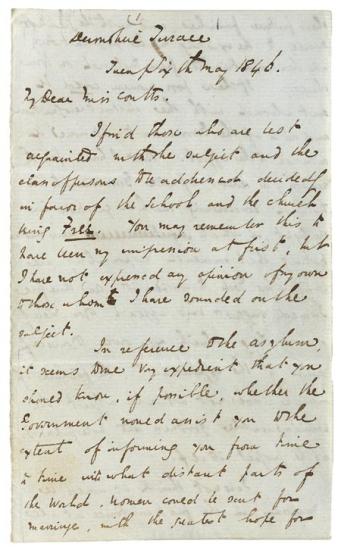
Autograph letter signed, London, 26 May 1846, to Angela Burdett-Coutts
Purchased with the assistance of the Fellows, 1951
This letter is the earliest in which Dickens makes reference to the project to create a home for prostitutes and petty miscreants that would become Urania Cottage. Dickens's fourteen-page letter sets out in detail his hopes and plans for the institution: "A woman or girl coming to the Asylum, it is explained to her that she has come there for useful repentance and reform, and because her past way of life has been dreadful in its nature and consequences, and full of affliction, misery, and despair to herself. Never mind Society while she is at that pass. Society has used her ill and turned away from her, and she cannot be expected to take much heed of its rights or wrongs." Dickens never used the term prostitute in any of his letters.
Philanthropy
From 1840 Dickens guided the charitable work of philanthropist Angela Burdett-Coutts (1814–1906), the wealthiest heiress in Victorian Britain. Dickens served as her official almoner and helped to assess the merits of the thousands of letters she received from those seeking financial assistance. He also advised on her plan for improved sanitation in the slums of Westminster and drew her attention and support to the Ragged School Union, which provided education to London's poorest children. A pragmatist, Dickens encouraged Burdett-Coutts to direct her philanthropy toward the causes of distress. In 1847 they founded a home, Urania Cottage, in Shepherd's Bush, as a shelter for homeless women—prostitutes or petty criminals who sought to rehabilitate themselves by learning practical skills and developing self-discipline. Many of the women were assisted to eventually emigrate to one of Britain's colonies to begin a new life. For more than ten years, Dickens administered Urania Cottage on behalf of Burdett-Coutts and played an extremely active role in its day-to-day management.
My Dear Miss Coutts.
I find those who are best acquainted with the subject and the class of persons to be addressed, decidedly in favor of the School and the Church being Free. You may remember this to have been my impression at first, but I have not expressed any opinion of my own to those whom I have sounded on the subject.
In reference to the Asylum, it seems to me very expedient that you should know, if possible, whether the Government would assist you to the extent of informing you from time to time into what distant parts of the World, women could be sent for marriage, with the greatest hope for
Letter 2 | 26 May 1846 | to Angela Burdett-Coutts, page 2

Autograph letter signed, London, 26 May 1846, to Angela Burdett-Coutts
Purchased with the assistance of the Fellows, 1951
This letter is the earliest in which Dickens makes reference to the project to create a home for prostitutes and petty miscreants that would become Urania Cottage. Dickens's fourteen-page letter sets out in detail his hopes and plans for the institution: "A woman or girl coming to the Asylum, it is explained to her that she has come there for useful repentance and reform, and because her past way of life has been dreadful in its nature and consequences, and full of affliction, misery, and despair to herself. Never mind Society while she is at that pass. Society has used her ill and turned away from her, and she cannot be expected to take much heed of its rights or wrongs." Dickens never used the term prostitute in any of his letters.
Philanthropy
From 1840 Dickens guided the charitable work of philanthropist Angela Burdett-Coutts (1814–1906), the wealthiest heiress in Victorian Britain. Dickens served as her official almoner and helped to assess the merits of the thousands of letters she received from those seeking financial assistance. He also advised on her plan for improved sanitation in the slums of Westminster and drew her attention and support to the Ragged School Union, which provided education to London's poorest children. A pragmatist, Dickens encouraged Burdett-Coutts to direct her philanthropy toward the causes of distress. In 1847 they founded a home, Urania Cottage, in Shepherd's Bush, as a shelter for homeless women—prostitutes or petty criminals who sought to rehabilitate themselves by learning practical skills and developing self-discipline. Many of the women were assisted to eventually emigrate to one of Britain's colonies to begin a new life. For more than ten years, Dickens administered Urania Cottage on behalf of Burdett-Coutts and played an extremely active role in its day-to-day management.
future families, and with the greatest service to the existing male population, whether expatriated from England or born there. If these poor women could be sent abroad with the distinct recognition and aid of the Government, it would be a service to the effort. But I have (with reason) a doubt of all Governments in England considering such a question in the light, in which men undertaking that immense responsibility, are bound, before God, to consider it. And therefore I would suggest this appeal to you, merely as something which you owe to yourself and to the experiment; the failure of which, does not at all affect the immeasurable goodness and hopefulness of the project itself.
I do not think it would be necessary, in the first instance at all
Letter 2 | 26 May 1846 | to Angela Burdett-Coutts, page 3
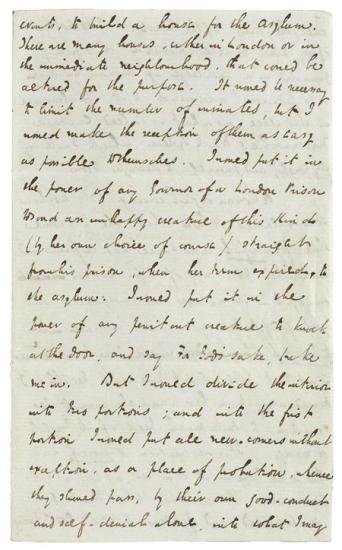
Autograph letter signed, London, 26 May 1846, to Angela Burdett-Coutts
Purchased with the assistance of the Fellows, 1951
This letter is the earliest in which Dickens makes reference to the project to create a home for prostitutes and petty miscreants that would become Urania Cottage. Dickens's fourteen-page letter sets out in detail his hopes and plans for the institution: "A woman or girl coming to the Asylum, it is explained to her that she has come there for useful repentance and reform, and because her past way of life has been dreadful in its nature and consequences, and full of affliction, misery, and despair to herself. Never mind Society while she is at that pass. Society has used her ill and turned away from her, and she cannot be expected to take much heed of its rights or wrongs." Dickens never used the term prostitute in any of his letters.
Philanthropy
From 1840 Dickens guided the charitable work of philanthropist Angela Burdett-Coutts (1814–1906), the wealthiest heiress in Victorian Britain. Dickens served as her official almoner and helped to assess the merits of the thousands of letters she received from those seeking financial assistance. He also advised on her plan for improved sanitation in the slums of Westminster and drew her attention and support to the Ragged School Union, which provided education to London's poorest children. A pragmatist, Dickens encouraged Burdett-Coutts to direct her philanthropy toward the causes of distress. In 1847 they founded a home, Urania Cottage, in Shepherd's Bush, as a shelter for homeless women—prostitutes or petty criminals who sought to rehabilitate themselves by learning practical skills and developing self-discipline. Many of the women were assisted to eventually emigrate to one of Britain's colonies to begin a new life. For more than ten years, Dickens administered Urania Cottage on behalf of Burdett-Coutts and played an extremely active role in its day-to-day management.
events, to build a house for the Asylum. There are many houses, either in London or in the immediate neighbourhood, that could be altered for the purpose. It would be necessary to limit the number of inmates, but I would make the reception of them as easy as possible to themselves. I would put it in the power of any Governor of a London Prison to send an unhappy creature of this kind (by her own choice of course) straight from his prison, when her term expired, to the Asylum. I would put it in the power of any penitent creature to knock at the door, and say For God's sake, take me in. But I would divide the interior into two portions; and into the first portion I would put all new-comers without exception, as a place of probation, whence they should pass, by their own good-conduct and self-denial alone, into what I may
Letter 2 | 26 May 1846 | to Angela Burdett-Coutts, page 4
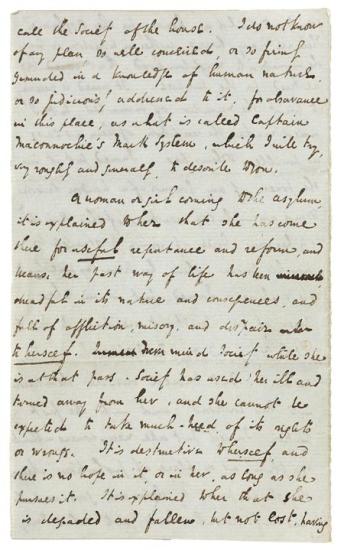
Autograph letter signed, London, 26 May 1846, to Angela Burdett-Coutts
Purchased with the assistance of the Fellows, 1951
This letter is the earliest in which Dickens makes reference to the project to create a home for prostitutes and petty miscreants that would become Urania Cottage. Dickens's fourteen-page letter sets out in detail his hopes and plans for the institution: "A woman or girl coming to the Asylum, it is explained to her that she has come there for useful repentance and reform, and because her past way of life has been dreadful in its nature and consequences, and full of affliction, misery, and despair to herself. Never mind Society while she is at that pass. Society has used her ill and turned away from her, and she cannot be expected to take much heed of its rights or wrongs." Dickens never used the term prostitute in any of his letters.
Philanthropy
From 1840 Dickens guided the charitable work of philanthropist Angela Burdett-Coutts (1814–1906), the wealthiest heiress in Victorian Britain. Dickens served as her official almoner and helped to assess the merits of the thousands of letters she received from those seeking financial assistance. He also advised on her plan for improved sanitation in the slums of Westminster and drew her attention and support to the Ragged School Union, which provided education to London's poorest children. A pragmatist, Dickens encouraged Burdett-Coutts to direct her philanthropy toward the causes of distress. In 1847 they founded a home, Urania Cottage, in Shepherd's Bush, as a shelter for homeless women—prostitutes or petty criminals who sought to rehabilitate themselves by learning practical skills and developing self-discipline. Many of the women were assisted to eventually emigrate to one of Britain's colonies to begin a new life. For more than ten years, Dickens administered Urania Cottage on behalf of Burdett-Coutts and played an extremely active role in its day-to-day management.
call the Society of the house. I do not know of any plan so well conceived, or so firmly grounded in a knowledge of human nature, or so judiciously addressed to it, for observance in this place, as what is called Captain Maconnochie's Mark System, which I will try, very roughly and generally, to describe to you.
A woman or girl coming to the Asylum, it is explained to her that she has come there for useful repentance and reform, and because her past way of life has been dreadful in its nature and consequences, and full of affliction, misery, and despair to herself. Never mind Society while she is at that pass. Society has used her ill and turned away from her, and she cannot be expected to take much heed of its rights or wrongs. It is destructive to herself, and there is no hope in it, or in her, as long as she pursues it. It is explained to her that she is degraded and fallen, but not lost, having
Letter 2 | 26 May 1846 | to Angela Burdett-Coutts, page 5

Autograph letter signed, London, 26 May 1846, to Angela Burdett-Coutts
Purchased with the assistance of the Fellows, 1951
This letter is the earliest in which Dickens makes reference to the project to create a home for prostitutes and petty miscreants that would become Urania Cottage. Dickens's fourteen-page letter sets out in detail his hopes and plans for the institution: "A woman or girl coming to the Asylum, it is explained to her that she has come there for useful repentance and reform, and because her past way of life has been dreadful in its nature and consequences, and full of affliction, misery, and despair to herself. Never mind Society while she is at that pass. Society has used her ill and turned away from her, and she cannot be expected to take much heed of its rights or wrongs." Dickens never used the term prostitute in any of his letters.
Philanthropy
From 1840 Dickens guided the charitable work of philanthropist Angela Burdett-Coutts (1814–1906), the wealthiest heiress in Victorian Britain. Dickens served as her official almoner and helped to assess the merits of the thousands of letters she received from those seeking financial assistance. He also advised on her plan for improved sanitation in the slums of Westminster and drew her attention and support to the Ragged School Union, which provided education to London's poorest children. A pragmatist, Dickens encouraged Burdett-Coutts to direct her philanthropy toward the causes of distress. In 1847 they founded a home, Urania Cottage, in Shepherd's Bush, as a shelter for homeless women—prostitutes or petty criminals who sought to rehabilitate themselves by learning practical skills and developing self-discipline. Many of the women were assisted to eventually emigrate to one of Britain's colonies to begin a new life. For more than ten years, Dickens administered Urania Cottage on behalf of Burdett-Coutts and played an extremely active role in its day-to-day management.
this shelter; and that the means of Return to Happiness are now about to be put into her own hands, and trusted to her own keeping. That with this view, she is, instead of being placed in this probationary class for a month, or two months, or three months, or any specified time whatever, required to earn there, a certain number of Marks (they are mere scratches in a book) so that she may make her probation a very short one, or a very long one, according to her own conduct. For so much work, she has so many Marks; for a day's good conduct, so many more. For every instance of ill-temper, disrespect, bad language, any outbreak of any sort or kind, so many—a very large number in proportion to her receipts—are deducted. A perfect Debtor and Creditor account is kept between her and the Superintendent, for every day; and the state of that account, it is in her own power and nobody else's, to adjust to her advantage. It is expressly pointed out to her, that before she can be considered qualified to return to any kind of society—even to the Society of the Asylum—she must give proofs of her power of self-restraint and her sincerity, and her determination to try to shew that she deserves the confidence it is proposed to place in her. Her
Letter 2 | 26 May 1846 | to Angela Burdett-Coutts, page 6
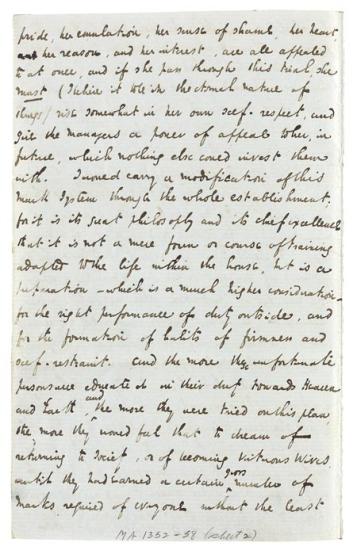
Autograph letter signed, London, 26 May 1846, to Angela Burdett-Coutts
Purchased with the assistance of the Fellows, 1951
This letter is the earliest in which Dickens makes reference to the project to create a home for prostitutes and petty miscreants that would become Urania Cottage. Dickens's fourteen-page letter sets out in detail his hopes and plans for the institution: "A woman or girl coming to the Asylum, it is explained to her that she has come there for useful repentance and reform, and because her past way of life has been dreadful in its nature and consequences, and full of affliction, misery, and despair to herself. Never mind Society while she is at that pass. Society has used her ill and turned away from her, and she cannot be expected to take much heed of its rights or wrongs." Dickens never used the term prostitute in any of his letters.
Philanthropy
From 1840 Dickens guided the charitable work of philanthropist Angela Burdett-Coutts (1814–1906), the wealthiest heiress in Victorian Britain. Dickens served as her official almoner and helped to assess the merits of the thousands of letters she received from those seeking financial assistance. He also advised on her plan for improved sanitation in the slums of Westminster and drew her attention and support to the Ragged School Union, which provided education to London's poorest children. A pragmatist, Dickens encouraged Burdett-Coutts to direct her philanthropy toward the causes of distress. In 1847 they founded a home, Urania Cottage, in Shepherd's Bush, as a shelter for homeless women—prostitutes or petty criminals who sought to rehabilitate themselves by learning practical skills and developing self-discipline. Many of the women were assisted to eventually emigrate to one of Britain's colonies to begin a new life. For more than ten years, Dickens administered Urania Cottage on behalf of Burdett-Coutts and played an extremely active role in its day-to-day management.
pride, her emulation, her sense of shame, her heart, her reason, and her interest, are all appealed to at once, and if she pass through this trial, she must (I believe it to be in the eternal nature of things) rise somewhat in her own self-respect, and give the managers a power of appeal to her, in future, which nothing else could invest them with. I would carry a modification of this Mark System through the whole establishment; for it is its great philosophy and its chief excellence that it is not a mere form or course of training adapted to the life within the house, but is a preparation—which is a much higher consideration—for the right performance of duty outside, and for the formation of habits of firmness and self-restraint. And the more these unfortunate persons were educated in their duty towards Heaven and Earth, and the more they were tried on this plan, the more they would feel that to dream of returning to Society, or of becoming Virtuous Wives, until they had earned a certain gross number of Marks required of everyone without the least
Letter 2 | 26 May 1846 | to Angela Burdett-Coutts, page 7
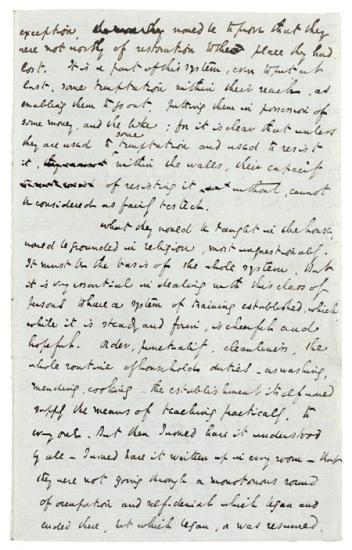
Autograph letter signed, London, 26 May 1846, to Angela Burdett-Coutts
Purchased with the assistance of the Fellows, 1951
This letter is the earliest in which Dickens makes reference to the project to create a home for prostitutes and petty miscreants that would become Urania Cottage. Dickens's fourteen-page letter sets out in detail his hopes and plans for the institution: "A woman or girl coming to the Asylum, it is explained to her that she has come there for useful repentance and reform, and because her past way of life has been dreadful in its nature and consequences, and full of affliction, misery, and despair to herself. Never mind Society while she is at that pass. Society has used her ill and turned away from her, and she cannot be expected to take much heed of its rights or wrongs." Dickens never used the term prostitute in any of his letters.
Philanthropy
From 1840 Dickens guided the charitable work of philanthropist Angela Burdett-Coutts (1814–1906), the wealthiest heiress in Victorian Britain. Dickens served as her official almoner and helped to assess the merits of the thousands of letters she received from those seeking financial assistance. He also advised on her plan for improved sanitation in the slums of Westminster and drew her attention and support to the Ragged School Union, which provided education to London's poorest children. A pragmatist, Dickens encouraged Burdett-Coutts to direct her philanthropy toward the causes of distress. In 1847 they founded a home, Urania Cottage, in Shepherd's Bush, as a shelter for homeless women—prostitutes or petty criminals who sought to rehabilitate themselves by learning practical skills and developing self-discipline. Many of the women were assisted to eventually emigrate to one of Britain's colonies to begin a new life. For more than ten years, Dickens administered Urania Cottage on behalf of Burdett-Coutts and played an extremely active role in its day-to-day management.
exception, would be to prove that they were not worthy of restoration to the place they had lost. It is a part of this system, even to put at last, some temptation within their reach, as enabling them to go out, putting them in possession of some money, and the like; for it is clear that unless they are used to some temptation and used to resist it, within the walls, their capacity of resisting it without, cannot be considered as fairly tested.
What they would be taught in the house, would be grounded in religion, most unquestionably. It must be the basis of the whole system. But it is very essential in dealing with this class of persons to have a system of training established, which, while it is steady and firm, is cheerful and hopeful. Order, punctuality, cleanliness, the whole routine of household duties—as washing, mending, cooking—the establishment itself would supply the means of teaching practically, to every one. But then I would have it understood by all—I would have it written up in every room—that they were not going through a monotonous round of occupation and self-denial which began and ended there, but which began, or was resumed,
Letter 2 | 26 May 1846 | to Angela Burdett-Coutts, page 8
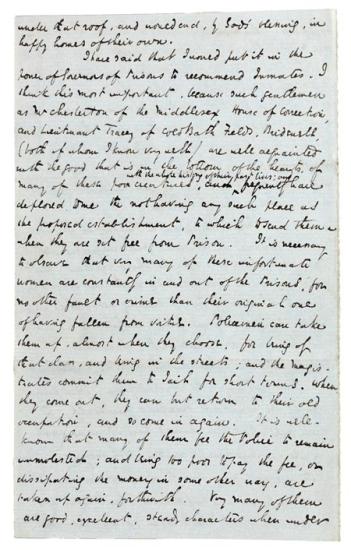
Autograph letter signed, London, 26 May 1846, to Angela Burdett-Coutts
Purchased with the assistance of the Fellows, 1951
This letter is the earliest in which Dickens makes reference to the project to create a home for prostitutes and petty miscreants that would become Urania Cottage. Dickens's fourteen-page letter sets out in detail his hopes and plans for the institution: "A woman or girl coming to the Asylum, it is explained to her that she has come there for useful repentance and reform, and because her past way of life has been dreadful in its nature and consequences, and full of affliction, misery, and despair to herself. Never mind Society while she is at that pass. Society has used her ill and turned away from her, and she cannot be expected to take much heed of its rights or wrongs." Dickens never used the term prostitute in any of his letters.
Philanthropy
From 1840 Dickens guided the charitable work of philanthropist Angela Burdett-Coutts (1814–1906), the wealthiest heiress in Victorian Britain. Dickens served as her official almoner and helped to assess the merits of the thousands of letters she received from those seeking financial assistance. He also advised on her plan for improved sanitation in the slums of Westminster and drew her attention and support to the Ragged School Union, which provided education to London's poorest children. A pragmatist, Dickens encouraged Burdett-Coutts to direct her philanthropy toward the causes of distress. In 1847 they founded a home, Urania Cottage, in Shepherd's Bush, as a shelter for homeless women—prostitutes or petty criminals who sought to rehabilitate themselves by learning practical skills and developing self-discipline. Many of the women were assisted to eventually emigrate to one of Britain's colonies to begin a new life. For more than ten years, Dickens administered Urania Cottage on behalf of Burdett-Coutts and played an extremely active role in its day-to-day management.
under that roof, and would end, by God's blessing, in happy homes of their own.
I have said that I would put it in the power of Governors of Prisons to recommend Inmates. I think this most important, because such gentlemen as Mr. Chesterton of the Middlesex House of Correction, and Lieutenant Tracey of Cold Bath Fields, Bridewell, (both of whom I know very well) are well acquainted with the good that is in the bottom of the hearts, of many of these poor creatures, and with the whole history of their past lives; and frequently have deplored to me the not having any such place as the proposed establishment, to which to send them—when they are set free from Prison. It is necessary to observe that very many of these unfortunate women are constantly in and out of the Prisons, for no other fault or crime than their original one of having fallen from virtue. Policemen can take them up, almost when they choose, for being of that class, and being in the streets; and the Magistrates commit them to Jail for short terms. When they come out, they can but return to their old occupation, and so come in again. It is well-known that many of them fee the Police to remain unmolested; and being too poor to pay the fee, or dissipating the money in some other way, are taken up again, forthwith. Very many of them are good, excellent, steady characters when under
Letter 2 | 26 May 1846 | to Angela Burdett-Coutts, page 9
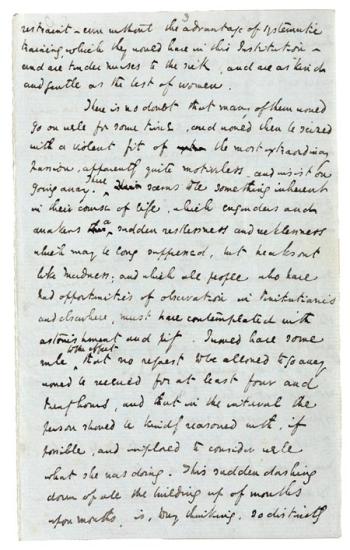
Autograph letter signed, London, 26 May 1846, to Angela Burdett-Coutts
Purchased with the assistance of the Fellows, 1951
This letter is the earliest in which Dickens makes reference to the project to create a home for prostitutes and petty miscreants that would become Urania Cottage. Dickens's fourteen-page letter sets out in detail his hopes and plans for the institution: "A woman or girl coming to the Asylum, it is explained to her that she has come there for useful repentance and reform, and because her past way of life has been dreadful in its nature and consequences, and full of affliction, misery, and despair to herself. Never mind Society while she is at that pass. Society has used her ill and turned away from her, and she cannot be expected to take much heed of its rights or wrongs." Dickens never used the term prostitute in any of his letters.
Philanthropy
From 1840 Dickens guided the charitable work of philanthropist Angela Burdett-Coutts (1814–1906), the wealthiest heiress in Victorian Britain. Dickens served as her official almoner and helped to assess the merits of the thousands of letters she received from those seeking financial assistance. He also advised on her plan for improved sanitation in the slums of Westminster and drew her attention and support to the Ragged School Union, which provided education to London's poorest children. A pragmatist, Dickens encouraged Burdett-Coutts to direct her philanthropy toward the causes of distress. In 1847 they founded a home, Urania Cottage, in Shepherd's Bush, as a shelter for homeless women—prostitutes or petty criminals who sought to rehabilitate themselves by learning practical skills and developing self-discipline. Many of the women were assisted to eventually emigrate to one of Britain's colonies to begin a new life. For more than ten years, Dickens administered Urania Cottage on behalf of Burdett-Coutts and played an extremely active role in its day-to-day management.
restraint—even without the advantage of systematic training, which they would have in this Institution—and are tender nurses to the sick, and are as kind and gentle as the best of women.
There is no doubt that many of them would go on well for some time, and would then be seized with a violent fit of the most extraordinary passion, apparently quite motiveless, and insist on going away. There seems to be something inherent in their course of life, which engenders and awakens a sudden restlessness and recklessness which may be long suppressed, but breaks out like Madness; and which all people who have had opportunities of observation in Penitentiaries and elsewhere, must have contemplated with astonishment and pity. I would have some rule to the effect that no request to be allowed to go away would be received for at least four and twenty hours, and that in the interval the person should be kindly reasoned with, if possible, and implored to consider well what she was doing. This sudden dashing down of all the building up of months upon months, is, to my thinking, so distinctly
Letter 2 | 26 May 1846 | to Angela Burdett-Coutts, page 10
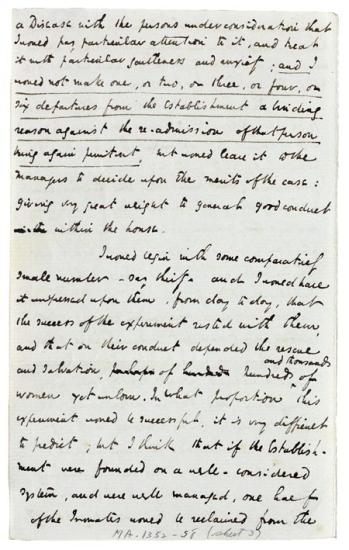
Autograph letter signed, London, 26 May 1846, to Angela Burdett-Coutts
Purchased with the assistance of the Fellows, 1951
This letter is the earliest in which Dickens makes reference to the project to create a home for prostitutes and petty miscreants that would become Urania Cottage. Dickens's fourteen-page letter sets out in detail his hopes and plans for the institution: "A woman or girl coming to the Asylum, it is explained to her that she has come there for useful repentance and reform, and because her past way of life has been dreadful in its nature and consequences, and full of affliction, misery, and despair to herself. Never mind Society while she is at that pass. Society has used her ill and turned away from her, and she cannot be expected to take much heed of its rights or wrongs." Dickens never used the term prostitute in any of his letters.
Philanthropy
From 1840 Dickens guided the charitable work of philanthropist Angela Burdett-Coutts (1814–1906), the wealthiest heiress in Victorian Britain. Dickens served as her official almoner and helped to assess the merits of the thousands of letters she received from those seeking financial assistance. He also advised on her plan for improved sanitation in the slums of Westminster and drew her attention and support to the Ragged School Union, which provided education to London's poorest children. A pragmatist, Dickens encouraged Burdett-Coutts to direct her philanthropy toward the causes of distress. In 1847 they founded a home, Urania Cottage, in Shepherd's Bush, as a shelter for homeless women—prostitutes or petty criminals who sought to rehabilitate themselves by learning practical skills and developing self-discipline. Many of the women were assisted to eventually emigrate to one of Britain's colonies to begin a new life. For more than ten years, Dickens administered Urania Cottage on behalf of Burdett-Coutts and played an extremely active role in its day-to-day management.
a Disease with the persons under consideration that I would pay particular attention to it, and treat it with particular gentleness and anxiety; and I would not make one, or two, or three, or four, or six departures from the Establishment a binding reason against the readmission of that person, being again penitent, but would leave it to the Managers to decide upon the merits of the case: giving very great weight to general good conduct within the house.
I would begin with some comparatively small number—say thirty—and I would have it impressed upon them, from day to day, that the success of the experiment rested with them, and that on their conduct depended the rescue and salvation, of hundreds and thousands of women yet unborn. In what proportion this experiment would be successful, it is very difficult to predict; but I think that if the Establishment were founded on a well-considered system, and were well managed, one half of the Inmates would be reclaimed from the
Letter 2 | 26 May 1846 | to Angela Burdett-Coutts, page 11
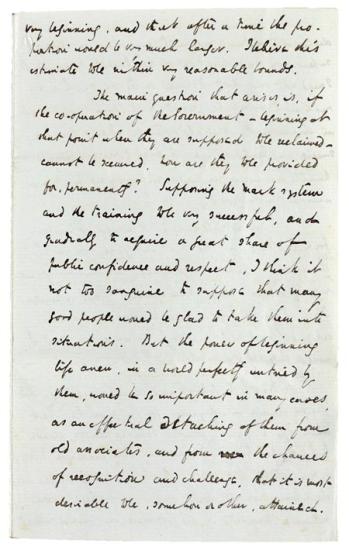
Autograph letter signed, London, 26 May 1846, to Angela Burdett-Coutts
Purchased with the assistance of the Fellows, 1951
This letter is the earliest in which Dickens makes reference to the project to create a home for prostitutes and petty miscreants that would become Urania Cottage. Dickens's fourteen-page letter sets out in detail his hopes and plans for the institution: "A woman or girl coming to the Asylum, it is explained to her that she has come there for useful repentance and reform, and because her past way of life has been dreadful in its nature and consequences, and full of affliction, misery, and despair to herself. Never mind Society while she is at that pass. Society has used her ill and turned away from her, and she cannot be expected to take much heed of its rights or wrongs." Dickens never used the term prostitute in any of his letters.
Philanthropy
From 1840 Dickens guided the charitable work of philanthropist Angela Burdett-Coutts (1814–1906), the wealthiest heiress in Victorian Britain. Dickens served as her official almoner and helped to assess the merits of the thousands of letters she received from those seeking financial assistance. He also advised on her plan for improved sanitation in the slums of Westminster and drew her attention and support to the Ragged School Union, which provided education to London's poorest children. A pragmatist, Dickens encouraged Burdett-Coutts to direct her philanthropy toward the causes of distress. In 1847 they founded a home, Urania Cottage, in Shepherd's Bush, as a shelter for homeless women—prostitutes or petty criminals who sought to rehabilitate themselves by learning practical skills and developing self-discipline. Many of the women were assisted to eventually emigrate to one of Britain's colonies to begin a new life. For more than ten years, Dickens administered Urania Cottage on behalf of Burdett-Coutts and played an extremely active role in its day-to-day management.
very beginning, and that after a time the proportion would be very much larger. I believe this estimate to be within very reasonable bounds.
The main question that arises, is, if the co-operation of the Government—beginning at that point when they are supposed to be reclaimed—cannot be secured, how are they to be provided for, permanently? Supposing the mark system and the training to be very successful, and gradually to acquire a great share of public confidence and respect, I think it not too sanguine to suppose that many good people would be glad to take them into situations. But the power of beginning life anew, in a world perfectly untried by them, would be so important in many cases, as an effectual detaching of them from old associates, and from the chances of recognition and challenge, that it is most desirable to be, somehow or other, attained.
Letter 2 | 26 May 1846 | to Angela Burdett-Coutts, page 12
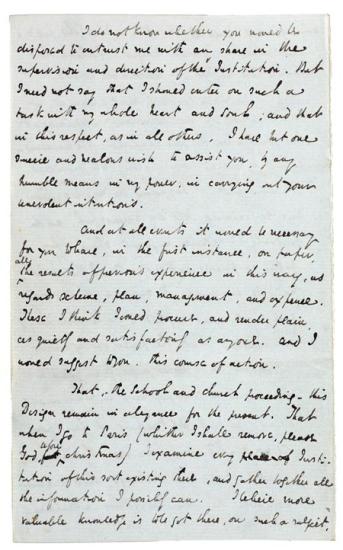
Autograph letter signed, London, 26 May 1846, to Angela Burdett-Coutts
Purchased with the assistance of the Fellows, 1951
This letter is the earliest in which Dickens makes reference to the project to create a home for prostitutes and petty miscreants that would become Urania Cottage. Dickens's fourteen-page letter sets out in detail his hopes and plans for the institution: "A woman or girl coming to the Asylum, it is explained to her that she has come there for useful repentance and reform, and because her past way of life has been dreadful in its nature and consequences, and full of affliction, misery, and despair to herself. Never mind Society while she is at that pass. Society has used her ill and turned away from her, and she cannot be expected to take much heed of its rights or wrongs." Dickens never used the term prostitute in any of his letters.
Philanthropy
From 1840 Dickens guided the charitable work of philanthropist Angela Burdett-Coutts (1814–1906), the wealthiest heiress in Victorian Britain. Dickens served as her official almoner and helped to assess the merits of the thousands of letters she received from those seeking financial assistance. He also advised on her plan for improved sanitation in the slums of Westminster and drew her attention and support to the Ragged School Union, which provided education to London's poorest children. A pragmatist, Dickens encouraged Burdett-Coutts to direct her philanthropy toward the causes of distress. In 1847 they founded a home, Urania Cottage, in Shepherd's Bush, as a shelter for homeless women—prostitutes or petty criminals who sought to rehabilitate themselves by learning practical skills and developing self-discipline. Many of the women were assisted to eventually emigrate to one of Britain's colonies to begin a new life. For more than ten years, Dickens administered Urania Cottage on behalf of Burdett-Coutts and played an extremely active role in its day-to-day management.
I do not know whether you would be disposed to entrust me with any share in the supervision and direction of the Institution. But I need not say that I should enter on such a task with my whole heart and soul; and that in this respect, as in all others, I have but one sincere and zealous wish to assist you, by any humble means in my power, in carrying out your benevolent intentions.
And at all events it would be necessary for you to have, in the first instance, on paper, all the results of previous experience in this way, as regards scheme, plan, management, and expence. These I think I could procure, and render plain, as quietly and satisfactorily as anyone. And I would suggest to you, this course of action.
That,—the School and Church proceeding—this Design remain in abeyance for the present. That when I go to Paris (whither I shall remove, please God, before Christmas) I examine every Institution of this sort existing there, and gather together all the information I possibly can. I believe more valuable knowledge is to be got there, on such a subject,
Letter 2 | 26 May 1846 | to Angela Burdett-Coutts, page 13
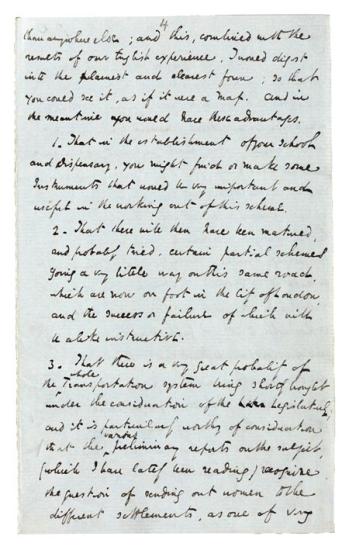
Autograph letter signed, London, 26 May 1846, to Angela Burdett-Coutts
Purchased with the assistance of the Fellows, 1951
This letter is the earliest in which Dickens makes reference to the project to create a home for prostitutes and petty miscreants that would become Urania Cottage. Dickens's fourteen-page letter sets out in detail his hopes and plans for the institution: "A woman or girl coming to the Asylum, it is explained to her that she has come there for useful repentance and reform, and because her past way of life has been dreadful in its nature and consequences, and full of affliction, misery, and despair to herself. Never mind Society while she is at that pass. Society has used her ill and turned away from her, and she cannot be expected to take much heed of its rights or wrongs." Dickens never used the term prostitute in any of his letters.
Philanthropy
From 1840 Dickens guided the charitable work of philanthropist Angela Burdett-Coutts (1814–1906), the wealthiest heiress in Victorian Britain. Dickens served as her official almoner and helped to assess the merits of the thousands of letters she received from those seeking financial assistance. He also advised on her plan for improved sanitation in the slums of Westminster and drew her attention and support to the Ragged School Union, which provided education to London's poorest children. A pragmatist, Dickens encouraged Burdett-Coutts to direct her philanthropy toward the causes of distress. In 1847 they founded a home, Urania Cottage, in Shepherd's Bush, as a shelter for homeless women—prostitutes or petty criminals who sought to rehabilitate themselves by learning practical skills and developing self-discipline. Many of the women were assisted to eventually emigrate to one of Britain's colonies to begin a new life. For more than ten years, Dickens administered Urania Cottage on behalf of Burdett-Coutts and played an extremely active role in its day-to-day management.
than anywhere else; and this, combined with the results of our English experience, I would digest into the plainest and clearest form; so that you could see it, as if it were a Map. And in the meantime you would have these advantages.
1. That in the establishment of your school and Dispensary, you might find or make some Instruments that would be very important and useful in the working out of this scheme.
2. That there will then have been matured, and probably tried, certain partial schemes going a very little way on this same road, which are now on foot in the City of London, and the success or failure of which will be alike instructive.
3. That there is a very great probability of the whole Transportation system being shortly brought under the consideration of the Legislature; and it is particularly worthy of consideration that the various preliminary reports on the subject, (which I have lately been reading) recognize the question of sending out women to the different settlements, as one of very
Letter 2 | 26 May 1846 | to Angela Burdett-Coutts, page 14

Autograph letter signed, London, 26 May 1846, to Angela Burdett-Coutts
Purchased with the assistance of the Fellows, 1951
This letter is the earliest in which Dickens makes reference to the project to create a home for prostitutes and petty miscreants that would become Urania Cottage. Dickens's fourteen-page letter sets out in detail his hopes and plans for the institution: "A woman or girl coming to the Asylum, it is explained to her that she has come there for useful repentance and reform, and because her past way of life has been dreadful in its nature and consequences, and full of affliction, misery, and despair to herself. Never mind Society while she is at that pass. Society has used her ill and turned away from her, and she cannot be expected to take much heed of its rights or wrongs." Dickens never used the term prostitute in any of his letters.
Philanthropy
From 1840 Dickens guided the charitable work of philanthropist Angela Burdett-Coutts (1814–1906), the wealthiest heiress in Victorian Britain. Dickens served as her official almoner and helped to assess the merits of the thousands of letters she received from those seeking financial assistance. He also advised on her plan for improved sanitation in the slums of Westminster and drew her attention and support to the Ragged School Union, which provided education to London's poorest children. A pragmatist, Dickens encouraged Burdett-Coutts to direct her philanthropy toward the causes of distress. In 1847 they founded a home, Urania Cottage, in Shepherd's Bush, as a shelter for homeless women—prostitutes or petty criminals who sought to rehabilitate themselves by learning practical skills and developing self-discipline. Many of the women were assisted to eventually emigrate to one of Britain's colonies to begin a new life. For more than ten years, Dickens administered Urania Cottage on behalf of Burdett-Coutts and played an extremely active role in its day-to-day management.
great importance.
I have that deep sense, dear Miss Coutts, of the value of your confidence in such a matter, and of the pure, exalted, and generous motives by which you are impelled, that I feel a most earnest anxiety that such an effort as you contemplate in behalf of your Sex, should have every advantage in the outset it can possibly receive, and should, if undertaken at all, be undertaken to the lasting honor of your name and Country. In this feeling, I make the suggestion I think best calculated to promote that end. Trust me, if you agree in it, I will not lose sight of the subject, or grow cold to it, or fail to bestow upon it my best exertions and reflection. But, if there be any other course you would prefer to take; and you will tell me so; I shall be as devoted to you in that as in this, and as much honored by being asked to render you the least assistance.
Ever Faithfully Yours
CD.